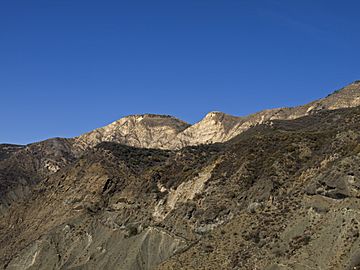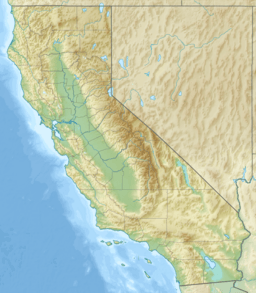Little Pine Mountain facts for kids
Quick facts for kids Little Pine Mountain |
|
|---|---|

Little Pine Mountain is on the right edge of the photo
|
|
| Highest point | |
| Elevation | 4,462 ft (1,360 m) NAVD 88 |
| Prominence | 518 ft (158 m) |
| Listing | Lower Peaks Committee |
| Geography | |
| Parent range | San Rafael Mountains |
| Topo map | USGS San Marcos Pass |
| Climbing | |
| Easiest route | Dirt road (Buckhorn-Camuesa OHV to Little Pine Road) |
Little Pine Mountain is a mountain located in Santa Barbara County, California. It's found within the Los Padres National Forest, right on the southern edge of the San Rafael Mountains. This mountain plays a role in separating two important water paths: Oso Creek and Santa Cruz Creek. Both of these creeks eventually flow into the Santa Ynez River. The mountain gets its name from a small group of Coulter pine trees that grow near its top.
Contents
Exploring Little Pine Mountain
Little Pine Mountain is a great place for outdoor adventures! You can reach the mountain by following the Santa Cruz National Recreation Trail. It's a popular spot for people who enjoy a day hike or mountain biking. Many visitors from Santa Barbara come here, especially during the cooler winter months. If you're looking for a place to rest, there's a camp called Happy Hollow Spring located close to the mountain's summit.
The Rocks of Little Pine Mountain
The rocks that make up Little Pine Mountain tell an interesting story about Earth's history.
Lower Slopes: Unique Soils
The rocks on the lower parts of the mountain come from something called the Franciscan Assemblage. These rocks create special soils known as "serpentine soils." These soils are unusual because they support a unique type of chaparral, which is a kind of shrubland with tough, woody plants. You can also see large amounts of dark-red cinnabar exposed on the ground in this area. Cinnabar is a mineral known for its bright red color.
Middle and Upper Slopes: Different Rock Layers
As you move up the mountain, the middle slopes are mostly made of rocks from the Espada Formation. The very top of the mountain, its summit, is largely made of Matilija Sandstone. This sandstone is a type of rock formed from sand grains cemented together over millions of years. There's also a small band of rock called the Temblor Formation. This type of rock is usually found much farther north, making its presence here quite interesting! On the northern side of the mountain, you'll mostly find Espada Formation rocks again, with a band of serpentinite splitting them in half.
 | Janet Taylor Pickett |
 | Synthia Saint James |
 | Howardena Pindell |
 | Faith Ringgold |



